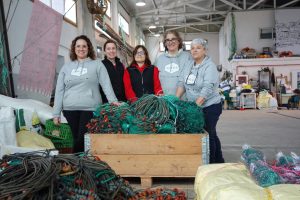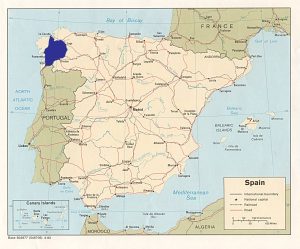Atalaia exemplifies the power of community and the enduring value of traditional craft in modern times
By Akila Veena (akilaveena19@gmail.com), Freelance writer based in Bengaluru, India
(Courtesy: The following text is based on the article “Women repairing fish nets is an old tradition”, which appeared in Eurofish April 2024/2 and is available at https://eurofish.dk/magazine-issues/em-2-2024/)
In the picturesque region of Galicia in northwest Spain, the tradition of netmaking and repair is deeply intertwined with the local fishing industry. This craft, historically carried out by women, has seen a resurgence thanks to the efforts of organized associations. Among these associations is Atalaia, a key member of the Galician Federation of Artisanal Netmakers, O Peiran.
Atalaia was established in 2005 in A Guarda, a small town where fishing is a vital part of the economy. Initially, the women of Atalaia worked from their homes, crafting and repairing nets for large fishing vessels operating in the Grand Sole Bank, a region in the Celtic Sea between Ireland and Spain. These vessels target species such as hake and anglerfish, requiring durable, expertly-made nets. Additionally, the women worked on nets for smaller coastal boats. The logistics were challenging, with nets being delivered to their homes by truck and van, but the dedication to their craft kept the tradition alive.

The early days of Atalaia were marked by significant logistical challenges. The nets, essential for fishing operations, were delivered to the town square by a large truck. From there, a van would distribute the nets to the home of each woman involved in the craft. This method, while effective, highlighted the need for a centralized workspace. The women managed to persuade the town council to provide them with a communal facility where they could work together. For over a decade, this facility became a hub of activity, with ten women working collaboratively to add the top and bottom lines to the nets and perform necessary repairs.
However, the association faced a significant challenge as the original members began to retire. The group dwindled to just three members, bringing Atalaia to the brink of dissolution. Marina Alvarez, one of the remaining members, reached out to O Peiran for support. Recognizing the critical situation, the federation organized net-making courses across Galicia. These courses not only preserved the skills but also attracted new members, revitalizing the association. Today, Atalaia boasts seven active members who are proficient in the craft.
Marina Alvarez expressed her delight at the progress made by the new members. “They can now do everything independently without having to ask me,” she says, highlighting the successful transfer of skills. For her, the addition of four new members not only ensured the continuity of the association but also demonstrated a renewed interest in the trade.
The netmakers of Atalaia continue to uphold a vital tradition while navigating modern challenges. The netmakers of Atalaia continue to uphold a vital tradition while navigating modern challenges
To supplement their income and showcase their creativity, the women of Atalaia also create various accessories from leftover materials. Brooches, bracelets, rings, and scarves are among the items they craft, blending traditional techniques with modern design. These products are displayed and sold in a store within their workspace, providing an additional revenue stream and a platform to exhibit their skills.
The association’s efforts extend beyond mere production. Atalaia actively promotes the profession through public outreach. They organize tours of their facilities and conduct workshops to educate the public about netmaking and repair. Schoolchildren, in particular, are introduced to this ancient craft, fostering an appreciation for the profession and potentially inspiring the next generation of netmakers. These initiatives aim to raise awareness about the trade and advocate for improvements in working conditions, social security, health benefits, and environmental issues.
At a broader level, O Peiran plays a crucial role in advocating for the netmaking profession. The federation seeks to regulate the trade nationally, ensuring a sustainable future for netmakers. One of its primary goals is to secure a new generation of netmakers to take over as the older generation retires. This involves not only training new entrants but also providing alternative employment opportunities during periods of inactivity.
Improving port infrastructure is another key focus of the Federation. By enhancing the facilities where netmakers work, O Peiran aims to reduce occupational injuries and create a safer working environment. The Federation’s efforts have already yielded significant successes, including organizing training sessions that improve the skills and employability of netmakers. These sessions culminate in professional certifications that recognize the expertise of both new and experienced netmakers. This formal accreditation is a crucial step in professionalizing the trade and ensuring its recognition at a national level.
Despite these positive developments, the netmaking industry faces significant challenges. Marina Alvarez acknowledges the ongoing challenge of undeclared work. Many individuals prefer to work from home without formalizing their activities, driven by economic pressures. This practice undermines the efforts of associations like Atalaia, making it difficult to attract new members and secure fair wages for all women in this trade.

Undeclared work is also a serious threat to decent work and fair wages, as such practices tend to undercut the wages of those working legitimately and hence deters young people from joining the profession. Marina Alvarez emphasizes that the quality of their manual work surpasses that of machine-made nets, providing a competitive edge. However, the proliferation of undeclared work jeopardizes the industry’s future, making it essential to address this issue.
Recycling is another area where Atalaia has made significant strides. The association has agreements with fishers to collect netting that can no longer be used. This material is then repurposed into new products or sent for commercial recycling, where it is converted into ropes and nets for mussel farming in Galicia. This practice not only supports the local economy but also contributes to environmental sustainability by addressing the issue of abandoned, lost, and discarded fishing gear, which contributes to marine plastic.
As the focus on sustainability intensifies, Atalaia is exploring the use of biodegradable nets. While fully biodegradable nets may not yet be viable due to durability concerns, mixtures of biodegradable and conventional materials offer a promising solution. These innovative materials balance functionality with environmental friendliness, aligning with the broader goal of sustainable fishing.
Since its inception, the Rederas Atalaia association has demonstrated remarkable resilience and adaptability. Through the support of the O Peiran Federation and their own innovative, the netmakers of Atalaia continue to uphold a vital tradition while navigating modern challenges. Their story is a testament to the power of community, the importance of preserving cultural heritage, and the potential for traditional craft to evolve and thrive in contemporary contexts.
By fostering a new generation of skilled netmakers, promoting sustainable practices, and advocating for fair working conditions, Atalaia and O Peiran are ensuring the future of this ancient craft. Their efforts exemplify how organized associations can make a significant impact, not only preserving a way of life but also adapting it to meet the demands of the present and future. The women of Atalaia are not just netmakers; they are custodians of a rich cultural legacy, innovators in their field, and a vital part of Galicia’s fishing community.